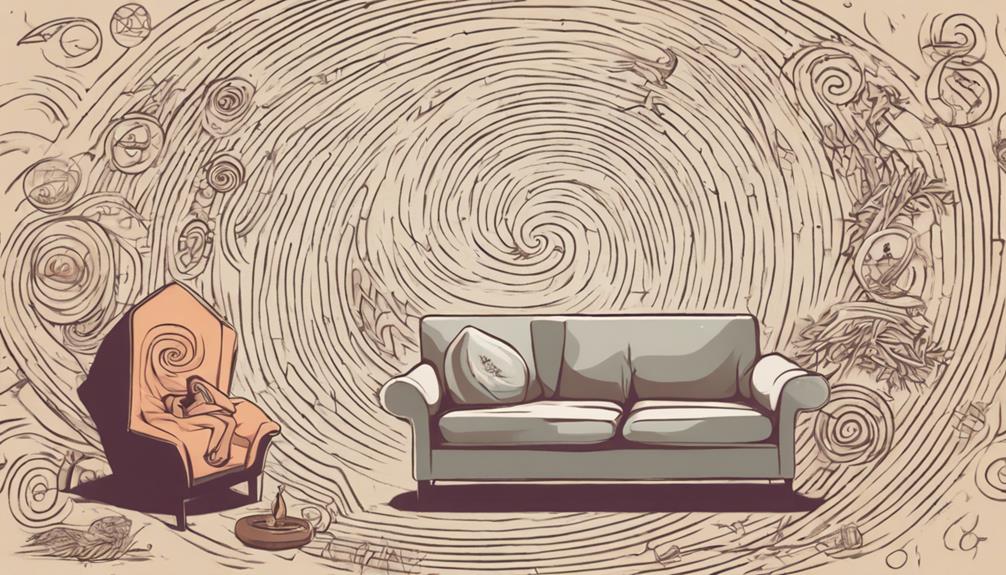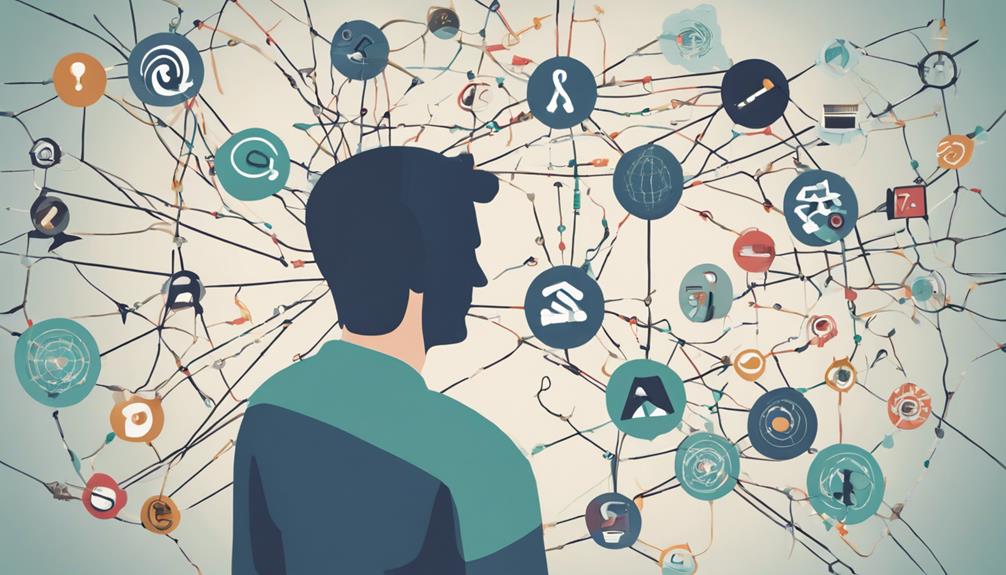Myths surrounding hypnotherapy effectiveness persist due to media misrepresentations, scientific gaps, cultural biases, and personal anecdotes shaping public views. Media sensationalism often overshadows the therapy's benefits, leading to skepticism. Scientific understanding remains incomplete, with research facing challenges. Cultural and historical stigmas further contribute to misconceptions, hindering mainstream acceptance. Personal stories and online misinformation also play a role in distorting perceptions. Seeking information from reliable sources and critical evaluation are crucial. A deeper look into the factors influencing these myths can provide a clearer understanding of hypnotherapy's true effectiveness.
Common Misconceptions About Hypnotherapy

Exploring the prevalent misconceptions surrounding hypnotherapy reveals a myriad of unfounded beliefs that often overshadow its evidence-based effectiveness. This widely misunderstood therapy is often plagued by misconceptions that hinder individuals from recognizing its therapeutic benefits.
One common misconception is that hypnotherapy is a form of mind control, where individuals lose their free will and are manipulated by the hypnotherapist. In reality, hypnotherapy is a collaborative process where the individual remains in control and can choose to accept or reject suggestions given during the session.
Another prevalent misconception is that hypnotherapy only works for certain individuals or personality types. Contrary to this belief, research has shown that hypnotherapy can be effective for a wide range of individuals dealing with various issues, such as anxiety, phobias, smoking cessation, and chronic pain.
Influence of Media Portrayals on Perception
The portrayal of hypnotherapy in the media significantly influences public perception and understanding of this therapeutic practice. Media plays a crucial role in shaping societal perceptions of hypnotherapy by showcasing it in various formats such as movies, TV shows, and news stories.
Unfortunately, these portrayals often sensationalize hypnotherapy, emphasizing its more dramatic and mystical aspects while downplaying its evidence-based therapeutic benefits. As a result, many individuals may develop misconceptions about hypnotherapy, viewing it as a form of mind control or entertainment rather than a legitimate therapeutic intervention.
Moreover, media influence can lead to skepticism and mistrust towards hypnotherapy among the general public. When hypnotherapy is inaccurately depicted or misrepresented in the media, it can contribute to the perpetuation of myths and misconceptions surrounding this practice.
Therefore, it is essential for media outlets to portray hypnotherapy accurately and responsibly to help foster a more informed and nuanced understanding of its potential benefits in the realm of mental health and well-being.
Lack of Scientific Understanding

Given the complexity of hypnotherapy as a therapeutic intervention, the lack of scientific understanding surrounding its mechanisms and efficacy remains a significant challenge in the field of mental health research.
Despite its long history and reported benefits, the scientific community still lacks robust empirical evidence to fully comprehend how hypnotherapy works and its effectiveness in treating various conditions.
Research studies exploring hypnotherapy often face methodological challenges, such as small sample sizes, inconsistent protocols, and difficulties in measuring subjective experiences.
While some studies suggest positive outcomes for hypnotherapy in certain conditions like chronic pain and anxiety, the overall body of scientific evidence is not yet conclusive.
Further rigorous research is needed to establish a clearer understanding of the mechanisms of hypnotherapy and its therapeutic potential.
Cultural and Historical Stigma
Cultural and historical stigma surrounding hypnotherapy has contributed to misconceptions and skepticism about its effectiveness as a therapeutic intervention. The historical origins of hypnotherapy can be traced back to ancient civilizations where altered states of consciousness were used in healing rituals. However, over time, hypnosis became associated with entertainment and charlatanism, perpetuating societal beliefs that it is a mystical or pseudoscientific practice.
Throughout history, hypnotherapy has been portrayed in literature and media as a tool for mind control or manipulation, further fueling skepticism and fear. These cultural representations have shaped public perception, leading to misconceptions about the true nature and benefits of hypnotherapy as a legitimate therapeutic technique.
The societal beliefs surrounding hypnotherapy have created a barrier for its acceptance in mainstream medicine and mental health care. Despite growing evidence supporting its efficacy in treating various conditions, the cultural and historical stigma attached to hypnotherapy continues to influence how it is perceived and utilized in modern healthcare settings.
Addressing these deep-rooted misconceptions is crucial in promoting a more accurate understanding of hypnotherapy's potential as a valuable therapeutic intervention.
Personal Experiences and Anecdotes

Perceptions of hypnotherapy effectiveness are often influenced by personal experiences and anecdotes shared by individuals who have undergone this therapeutic intervention. Client testimonials play a significant role in shaping public opinion regarding the efficacy of hypnotherapy. These personal accounts can range from individuals reporting successful outcomes such as smoking cessation or weight loss to those describing profound psychological breakthroughs and improved well-being.
Moreover, hypnotic regression, a technique used in hypnotherapy to explore past memories or experiences, often elicits powerful anecdotes from clients. These experiences are sometimes seen as evidence of the therapeutic benefits of hypnotherapy, as clients may report gaining insights, resolving long-standing issues, or experiencing emotional healing through this process.
While personal experiences and anecdotes can be compelling, it is essential to approach them with caution. Anecdotal evidence, while valuable in providing insights into individual experiences, is not a substitute for rigorous scientific research. Therefore, it is crucial to complement client testimonials with empirical studies to gain a comprehensive understanding of hypnotherapy effectiveness.
Skepticism in the Medical Community
Medical professionals often approach hypnotherapy with a degree of skepticism, questioning its effectiveness and validity as a therapeutic intervention. This skepticism within the medical community stems from various factors.
One primary concern is the lack of standardized training and certification requirements for hypnotherapists. Unlike other medical professions, hypnotherapy does not have strict regulatory bodies overseeing the qualifications and practices of practitioners. This absence of standardized professional qualifications raises doubts about the credibility and reliability of hypnotherapy as a legitimate medical treatment.
Moreover, the subjective nature of hypnotherapy outcomes contributes to the skepticism among medical professionals. The variability in patient responses and the absence of concrete scientific evidence supporting the mechanisms of hypnosis make it challenging for healthcare providers to fully embrace hypnotherapy as a mainstream therapeutic approach.
Without robust empirical data demonstrating its efficacy beyond a placebo effect, medical skepticism towards hypnotherapy persists, highlighting the need for further research and standardization within the field.
The Role of Misinformation Online

The proliferation of misinformation about hypnotherapy on online platforms has contributed significantly to shaping public attitudes and understanding of this therapeutic practice. Misinformation spread through online sources can have detrimental effects on how hypnotherapy is perceived by the general population. Often, inaccurate information about hypnotherapy's effectiveness, safety, and methods can lead to misconceptions and unwarranted skepticism.
Online platforms provide a vast space for various individuals to share their opinions and experiences with hypnotherapy, but not all information shared is accurate or based on scientific evidence. Biased opinions, anecdotal stories, and false claims can rapidly spread across social media, blogs, and forums, influencing individuals seeking information about hypnotherapy.
It is crucial for individuals to critically evaluate the information they encounter online regarding hypnotherapy. Relying on reputable sources, such as scientific studies, professional organizations, and licensed practitioners, can help individuals sift through the abundance of misinformation and form a more accurate understanding of hypnotherapy's benefits and limitations.
Frequently Asked Questions
Can Hypnotherapy Erase Memories or Alter Personalities?
Hypnotherapy is not scientifically proven to erase memories or alter personalities. While it can enhance recall or influence behavior through suggestion, the idea of memory manipulation or personality alteration through hypnosis is unsubstantiated by empirical research.
Is Hypnotherapy Effective for Treating All Mental Health Conditions?
Hypnotherapy shows treatment success for various mental health conditions like anxiety and phobias. Research explores its limitations, such as effectiveness variations and the need for skilled practitioners. Evidence-based studies support its role in comprehensive mental health care.
Are There Any Risks or Side Effects Associated With Hypnotherapy?
When considering hypnotherapy, it is essential to acknowledge potential dangers and unintended consequences. While generally safe, risks may include false memories, heightened emotional responses, or exacerbation of underlying psychological conditions. It's imperative to work with qualified professionals.
Can Hypnotherapy Be Used to Uncover Repressed Memories?
Hypnotherapy can be used to facilitate memory retrieval, potentially uncovering repressed memories. However, ethical concerns arise regarding the creation of false memories. Despite this, hypnotherapy may offer therapeutic benefits when used cautiously and in conjunction with other therapeutic modalities.
How Long Does the Effects of Hypnotherapy Last After Treatment?
Studies have shown that the long-term benefits of hypnotherapy can vary among individuals. Follow-up studies indicate mixed results, with some patients reporting sustained effects while others experience relapses. Patient testimonials offer valuable insights into the effectiveness over time.
Conclusion
In conclusion, myths surrounding the effectiveness of hypnotherapy persist due to common misconceptions, media portrayals, lack of scientific understanding, cultural stigma, personal experiences, skepticism in the medical community, and the role of misinformation online.
Addressing these factors through education, research, and evidence-based practice can help dispel these myths and promote a more accurate understanding of the potential benefits of hypnotherapy.
